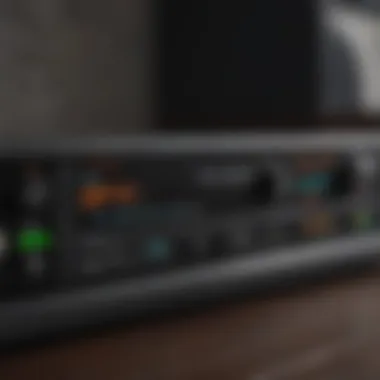Comparing WiFi Boosters and Routers: Which One Suits Your Network Best?


Overview
In the realm of modern networking setups, the distinction between Wi Fi boosters and routers holds paramount importance. This article aims to unravel the intricate disparities between these essential components, guiding readers towards making informed decisions when optimizing their home or office network. As technological advancements continue to evolve, understanding the functionalities, advantages, and limitations of WiFi boosters and routers becomes crucial for a seamless networking experience.
Features & Specifications
Delving into the technical realm, it is imperative to grasp the key features and specifications that differentiate Wi Fi boosters from routers. WiFi boosters, also known as range extenders, primarily enhance the signal strength and coverage of an existing WiFi network. On the other hand, routers serve as the central hub of a network, facilitating the connection of multiple devices and managing data traffic efficiently. Understanding the bandwidth, frequency, range, and compatibility aspects of these devices is fundamental in optimizing network performance.
Pros and Cons
Unveiling the advantages and disadvantages of Wi Fi boosters and routers sheds light on their distinct functionalities. WiFi boosters excel in extending WiFi coverage to dead zones or areas with poor signal reception, providing a cost-effective solution for improving network range. However, they may lead to a slight decrease in network speed due to signal attenuation. Conversely, routers offer superior data handling capabilities and customization options, ensuring optimal network efficiency. Yet, their coverage may be limited in larger spaces, necessitating the use of additional boosters for comprehensive coverage.
User Experience
Real-world user impressions offer valuable insights into the practical utility of Wi Fi boosters and routers. Customers praise WiFi boosters for resolving connectivity issues in remote areas of their homes or offices, appreciating the seamless integration and enhanced signal strength these devices provide. Likewise, router users commend the stable connections and robust performance of routers in managing multiple devices simultaneously, ensuring a smooth and uninterrupted networking experience. Incorporating user feedback enriches the understanding of these devices' usability and reliability in diverse settings.
Buying Guide
Navigating through the myriad of options available in the market can be overwhelming for potential buyers. A strategic buying guide encapsulates recommendations based on performance, value for money, and target audience preferences. While Wi Fi boosters offer a tangible solution for extending network coverage at a budget-friendly price point, routers cater to users seeking advanced customization features and enhanced network management capabilities. Tailoring recommendations to align with specific user requirements ensures an informed purchase decision tailored to individual networking needs.
Introduction
A critical aspect of modern networking setups is understanding the disparities between Wi Fi boosters and routers. Both serve vital functions but come with distinct functionalities, advantages, and limitations. To optimize one's home or office network effectively, making an informed decision between these two devices is imperative. WiFi boosters and routers play pivotal roles in ensuring robust network connections, contributing to seamless online experiences.
A Wi Fi booster, also known as a WiFi extender or repeater, is designed to amplify the existing signal from the router to extend network coverage to hard-to-reach areas. On the other hand, a router serves as the central hub of a network, directing traffic between different devices and ensuring that data packets reach their intended destinations smoothly. Understanding the nuances of both devices can significantly impact the performance and reliability of your network.
In this comprehensive comparison, we will delve deep into the intricate details of Wi Fi boosters and routers, exploring their functionalities, advantages, and limitations. By analyzing factors such as network coverage, speed and performance, ease of installation, cost considerations, scalability, and flexibility, readers will gain a thorough understanding of which device aligns best with their specific requirements. Stay tuned as we unravel the complexities of WiFi boosters and routers to empower you with the knowledge needed to make informed decisions for your network infrastructure.
Understanding WiFi Boosters
Understanding Wi Fi Boosters is crucial in comprehending the intricacies of modern networking setups. In this increasingly interconnected world, the demand for seamless and reliable internet connectivity has never been higher. WiFi boosters play a pivotal role in extending the reach of your wireless network, ensuring that signal strength remains consistent and stable throughout your home or office space. By delving into the specifics of how WiFi boosters function and the advantages they offer, you can make well-informed decisions to enhance your overall network performance.


Definition of Wi
Fi Boosters
A Wi Fi booster, also known as a WiFi extender or WiFi repeater, is a device designed to enhance the coverage of an existing wireless network. It works by receiving the WiFi signal from your router and amplifying it, effectively broadening the coverage area. This device essentially fills in dead zones or areas with poor signal strength, providing a more robust connection throughout your premises.
How WiFi Boosters Work
Wi Fi boosters operate by receiving the existing WiFi signal from your router, amplifying it, and then rebroadcasting it to extend the coverage area. This process helps eliminate dead zones and ensures that all areas within your home or office receive a stable and reliable internet connection. By strategically placing WiFi boosters throughout the space, you can create a mesh network that blankets the entire area with strong WiFi coverage.
Benefits of WiFi Boosters
The benefits of Wi Fi boosters include improved signal strength, extended coverage area, seamless connectivity, and enhanced reliability. By eliminating dead zones and weak signal areas, WiFi boosters enhance the overall user experience by providing consistent internet access across all devices. Additionally, they are easy to install, cost-effective compared to upgrading to a more powerful router, and can significantly improve network performance without the need for complex configurations.
Limitations of Wi
Fi Boosters
Despite their advantages, Wi Fi boosters have limitations that users should consider. One primary limitation is signal degradation, as each time the signal is repeated, there is a potential loss of bandwidth. Additionally, WiFi boosters may not be as effective in extremely large spaces or areas with significant interference. Users should also be mindful of maintaining the appropriate distance between the booster and the router for optimal performance.
Types of WiFi Boosters
There are several types of Wi Fi boosters available, each catering to specific needs and preferences. Some common types include plug-in WiFi boosters, desktop WiFi extenders, and outdoor WiFi repeaters. Plug-in boosters are compact and easy to install, making them ideal for home use, while desktop extenders offer more extensive coverage for larger spaces. Outdoor repeaters are designed for outdoor areas and can withstand various weather conditions, providing WiFi connectivity in exterior settings.
Exploring Routers
In this pivotal section of the comprehensive comparison between Wi Fi boosters and routers, we delve deep into the realm of routers - the backbone of modern networking systems. Routers play a crucial role in facilitating communication between devices within a network, ensuring seamless data transmission and connectivity. The significance of exploring routers lies in understanding their essential functions, capabilities, and impact on the overall network performance.
Role of Routers in Networking
The role of routers in networking is multifaceted and vital. Routers act as traffic officers, directing data packets between devices in a network to ensure efficient communication. They establish connections between different networks, allowing devices to exchange information across various platforms. Moreover, routers play a pivotal role in providing network security by implementing firewalls and encryption protocols, safeguarding sensitive data from potential threats and breaches.
Key Features of Routers


Routers boast an array of key features that make them indispensable in modern networking environments. These features include ethernet ports for wired connections, wireless connectivity through Wi-Fi, advanced Quality of Service (Qo S) settings for optimizing network performance, and robust security features to protect against cyber threats. Additionally, routers often come equipped with guest network capabilities, parental controls, and USB ports for file sharing and device connectivity, enhancing their versatility and functionality.
Advantages of Routers
The advantages of routers are numerous and impactful. Routers offer high-speed internet connectivity, enabling fast data transfer speeds and low latency, crucial for bandwidth-intensive activities such as online gaming and video streaming. They provide reliable network coverage, ensuring a stable connection throughout a designated area. Additionally, routers support multi-device connectivity, allowing numerous devices to be connected simultaneously without compromising network performance.
Considerations When Choosing a Router
When selecting a router, several essential considerations come into play. Factors such as network size, internet speed requirements, the number of connected devices, and desired features like dual-band connectivity, MU-MIMO technology, and beamforming should be taken into account. It's crucial to assess whether a router meets both current and future networking needs, considering scalability, security protocols, and compatibility with existing network infrastructure.
Comparison between Wi
Fi Boosters and Routers
In this detailed comparison between Wifi boosters and routers, we delve into the intricate nuances and functionalities of these essential networking components. Understanding the disparities between these devices is crucial in optimizing network performance efficiently. Wifi boosters, also known as extenders or repeaters, are designed to amplify the existing Wifi signal and extend its coverage to areas with poor connectivity. On the other hand, routers serve as the core of a network, responsible for transmitting data packets between devices and connecting them to the internet. By contrasting the network coverage, speed, installation, cost considerations, scalability, and flexibility of Wifi boosters and routers, we aim to equip readers with the knowledge to make informed decisions when setting up or improving their network infrastructure.
Network Coverage
Network coverage is a critical factor in determining the effectiveness of Wifi boosters and routers. Wifi boosters excel in expanding coverage to hard-to-reach areas by capturing the existing signal and rebroadcasting it. However, this extended coverage may come at the expense of signal strength and speed. On the other hand, routers provide reliable coverage within a specified range, delivering consistent signal strength for connected devices. Understanding the trade-offs between extended coverage and signal stability is essential in selecting the most suitable device for your network setup.
Speed and Performance
When it comes to speed and performance, routers typically outperform Wifi boosters due to their direct connection to the internet source. Routers offer faster data transfer speeds and lower latency, making them ideal for bandwidth-intensive activities such as online gaming or HD streaming. In contrast, Wifi boosters may experience signal degradation or interference, leading to slower speeds and reduced performance. Evaluating your network requirements and usage patterns is crucial in determining whether a router or a Wifi booster is more suitable for your needs.
Ease of Installation
In terms of installation, Wifi boosters are relatively straightforward to set up, requiring minimal technical knowledge. Most boosters come with intuitive instructions and can be easily plugged into a power outlet to enhance signal coverage. Routers, on the other hand, involve a more complex installation process, including configuring network settings, connecting cables, and ensuring proper placement for optimal performance. Consider your comfort level with technology and the ease of installation when choosing between a Wifi booster and a router.
Cost Considerations
Cost considerations play a significant role in deciding between Wifi boosters and routers. Wifi boosters are generally more cost-effective than routers, offering a budget-friendly solution for extending network coverage without investing in additional infrastructure. Routers, while providing superior performance and features, can be more expensive upfront, especially for models with advanced capabilities such as dual-band connectivity or mesh networking. Assessing your budget constraints and long-term network requirements is essential in determining the most cost-effective option for your networking needs.
Scalability and Flexibility


Scalability and flexibility are key considerations in building a resilient network infrastructure. Routers offer greater scalability and customization options, allowing users to expand their network capabilities by adding additional devices or upgrading to advanced models. Wifi boosters, albeit effective for extending coverage in specific areas, may lack the scalability features of routers and can be limited in their flexibility. Understanding your future expansion plans and network growth is imperative in selecting a device that aligns with your long-term networking objectives.
Selecting the Right Device for Your Needs
In the realm of networking, choosing between a Wi Fi booster and a router is a crucial decision that can significantly impact the performance of your network setup. Understanding the specific requirements of your home or office space is essential when selecting the right device. Factors such as network coverage, the number of devices to be connected, and the network speed requirements play a pivotal role in this decision-making process.
Factors to Consider
Area of Coverage
When considering the area of coverage, you must assess the size of the space that requires a stable and strong Wi Fi signal. The area of coverage determines the range within which your devices can connect to the network without experiencing signal degradation. For larger spaces, such as offices or homes with multiple floors, you may require a device with extended coverage capabilities to ensure seamless connectivity throughout the premises. While a WiFi booster can enhance the signal reach within a specific area, a router with advanced antenna technology may offer broader coverage but could be limited by obstacles such as walls and furniture.
Number of Devices
The number of devices that need to be connected to the network concurrently is a critical factor in choosing the right networking device. A router typically supports multiple device connections, distributing the available bandwidth among them efficiently. However, if you have a high number of devices demanding simultaneous connectivity, a Wi Fi booster strategically placed near the devices can alleviate network congestion and improve performance. Understanding the device capacity of each option is essential to prevent network slowdowns and ensure a smooth user experience.
Network Speed Requirements
Network speed requirements vary depending on the nature of activities conducted over the network. If your usage involves data-intensive tasks like streaming high-definition videos or online gaming, opting for a device that offers high-speed connectivity is imperative. Routers equipped with advanced technology can deliver faster data transfer rates and reduce latency, enhancing the overall user experience. Conversely, Wi Fi boosters focus on amplifying existing signals, which may not always translate to a substantial increase in network speed. Assessing your specific speed needs and balancing them with other factors is key to selecting a device that aligns with your networking requirements.
Expert Recommendations
When navigating the choice between Wi Fi boosters and routers, seeking expert recommendations can provide valuable insights into optimizing your network performance. Industry professionals and tech enthusiasts often offer guidance on selecting the right device based on your unique needs and usage patterns. Consider consulting with experts in the field to gain a deeper understanding of the technical specifications, features, and compatibility requirements of each device. Their recommendations can help tailor your networking solution to maximize efficiency and performance, ensuring a seamless connectivity experience for all your devices.
Conclusion
The conclusion of the comprehensive comparison between Wi Fi boosters and routers serves as a pivotal point in understanding the optimal choice for enhancing network performance. In this highly competitive digital era, where seamless connectivity is paramount, discerning between these two essential components can significantly impact user experience and overall productivity. By delving deep into the nuances of WiFi boosters and routers, individuals gain valuable insights into the functionalities, advantages, and limitations that shape their networking setups.
Focusing on the network coverage aspect, Wi Fi boosters excel in extending the reach of wireless signals to remote corners of a home or office, tackling dead zones effectively. On the other hand, routers form the backbone of a network, orchestrating data traffic and enabling multiple devices to connect seamlessly. Understanding this distinction aids in optimizing coverage based on specific spatial requirements.
When evaluating speed and performance, routers often deliver faster and more stable connections compared to boosters. This is crucial for activities like online gaming, video streaming, or video conferencing that demand high bandwidth and low latency. Routers, with advanced technologies like MU-MIMO and beamforming, ensure an unparalleled network experience for users.
Ease of installation emerges as a significant factor where boosters shine, offering plug-and-play setups that require minimal technical know-how. Conversely, routers demand a bit more configuration, catering to users seeking customized network settings or advanced security features. Unraveling this disparity simplifies decision-making based on convenience and user proficiency.
Cost considerations play a vital role in the selection process, with boosters presenting a cost-effective solution for enhancing existing networks without substantial investments. Routers, although relatively pricier, offer long-term reliability and performance, justifying their upfront costs over time. Balancing budget constraints with long-term benefits is essential for economic sustainability.
Scalability and flexibility reveal contrasting attributes between boosters and routers, with the former excelling in adaptability to evolving network dynamics. Boosters can be conveniently relocated or added based on changing coverage needs, providing a scalable solution for expanding networks. Routers, while inherently robust, require careful consideration of future scalability requirements to avoid network limitations.
Conclusively, selecting the right device - whether a Wi Fi booster or router - hinges on a nuanced understanding of individual requirements, network complexities, and budget constraints. This comparative analysis elucidates the vital differences that empower users to make informed decisions aligned with their networking objectives. By weighing these considerations judiciously, individuals pave the way for seamless connectivity and enhanced digital experiences tailored to their unique needs and preferences.







